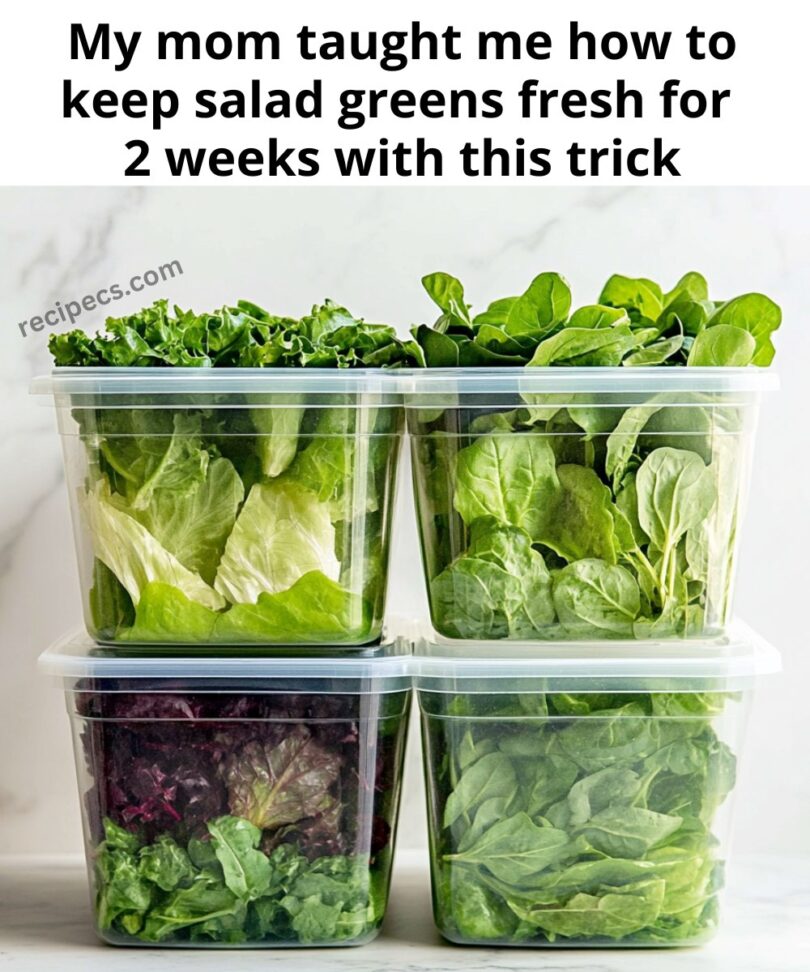ADVERTISEMENT
1. Wash and Dry Thoroughly (if needed)
The first step is to decide if you want to wash your greens before storing them or wash them just before use.
- If you prefer to wash them in advance, use a salad spinner or a clean kitchen towel to dry the leaves thoroughly. Excess moisture is the enemy of fresh greens, so make sure to dry them well. You can even lay the greens out on a paper towel to absorb any remaining moisture. A salad spinner is the most effective tool for this, as it removes as much water as possible without damaging the leaves.
- Alternatively, if you don’t want to wash your greens until you’re ready to use them, simply leave them unwashed in their original packaging or container. This will help extend their shelf life by keeping moisture to a minimum until you’re ready to prepare them.
2. Store in an Airtight Container with a Paper Towel
The secret to prolonging the freshness of salad greens lies in controlling moisture. One of the best methods is to store your washed and dried greens in an airtight container with a paper towel. Here’s how to do it:
- Use an airtight container: Choose a plastic or glass container with a tight-fitting lid. This helps keep the greens fresh by limiting exposure to air, which can lead to oxidation and wilting.
- Layer with paper towels: Lay a paper towel at the bottom of the container before adding your salad greens. Then, place another paper towel on top of the greens. The paper towels will absorb any excess moisture, preventing it from accumulating at the bottom of the container, which can cause sogginess. The greens will stay dry and crisp for longer.
- Keep the lid slightly ajar: If possible, leave the lid of the container slightly open or use a container that allows for some airflow. This will help prevent moisture from building up inside the container, which can lead to mold and spoilage.
3. Store in the Crisper Drawer of Your Fridge
The crisper drawer in your refrigerator is designed to maintain a higher humidity level, which is perfect for storing fresh produce like salad greens. Store your airtight container with greens in the crisper drawer to maintain a cool and slightly humid environment. This helps preserve their freshness while keeping them away from overly dry or cold conditions, which can cause wilting or browning.
4. Avoid Overcrowding
When storing salad greens, make sure not to overcrowd the container. If you pack them too tightly, they won’t be able to breathe properly, and the lack of airflow can lead to faster spoilage. A little space allows for air circulation, keeping the leaves fresher for longer.
5. Use Produce-Specific Bags (Optional)
For an extra layer of protection, you can purchase produce-specific storage bags designed to keep vegetables fresh longer. These bags are often made with materials that allow for controlled ventilation and moisture control, mimicking the conditions found in the crisper drawer. If you’re storing greens in a bag, it’s still a good idea to include a paper towel to absorb moisture.
6. Keep Greens Whole Until Ready to Use
If possible, try to store your salad greens whole rather than pre-chopping them. Pre-cut greens tend to spoil more quickly because their exposed edges are more prone to oxidation. Keep your greens intact until you’re ready to use them, and only tear or chop them just before serving or preparing your meal.
Additional Tips for Keeping Salad Greens Fresh
- Check for Spoiled Leaves Regularly: Even with the best storage techniques, some leaves may begin to spoil faster than others. Check your salad greens periodically for any wilting, browning, or slimy leaves, and remove them immediately. This helps prevent the spoiled leaves from affecting the rest of the greens.
- Use Ventilated Produce Bags: If you want to go the extra mile, invest in reusable, ventilated produce bags designed to keep greens fresh longer. These bags allow for airflow while also controlling moisture.
- Consider Freezing for Long-Term Storage: If you have a large quantity of greens that you can’t use quickly enough, consider freezing them. Wash and dry your greens thoroughly, blanch them in boiling water for a couple of minutes, then freeze them in airtight bags. Frozen greens are great for smoothies or cooked dishes but are not ideal for salads, as they lose their crisp texture.
How Long Can Salad Greens Last?
With the right storage method, you can keep your greens fresh for up to 7-10 days in the refrigerator, depending on the type of greens and how fresh they were when you bought them. Delicate greens like arugula or spinach may last closer to 7 days, while hardier greens like kale and romaine can last up to 10 days or longer.
Final Thoughts
Storing salad greens properly can make a world of difference when it comes to reducing food waste and ensuring you always have fresh, crisp greens on hand. With these simple tips—washing and drying thoroughly, using airtight containers with paper towels, and storing in the fridge’s crisper drawer—you can extend the shelf life of your greens and enjoy them longer. No more tossing out wilted lettuce or soggy spinach—just fresh, vibrant greens ready to go whenever you are.
Give these methods a try the next time you buy salad greens, and you’ll be amazed at how much longer they last. Say goodbye to wasted produce and hello to fresh salads all week long!
ADVERTISEMENT
ADVERTISEMENT
